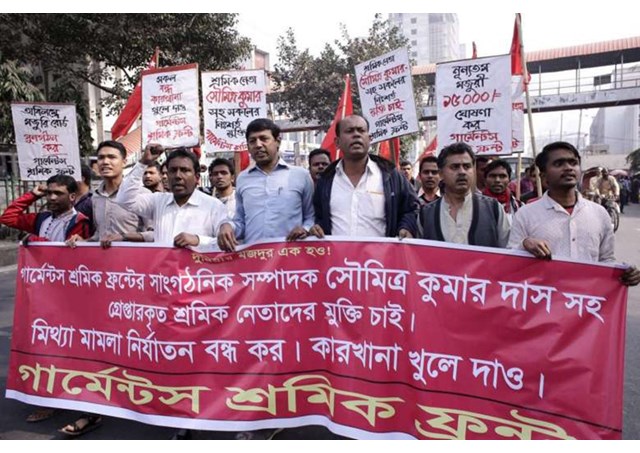
Bangladesh: Garment factories dismiss 'at least 1,500 workers'

Police in Bangladesh say garment manufacturers have dismissed at least 1,500 workers after protests over pay led to a week-long shutdown at dozens of factories, which supply clothes to top Western brands.
Police described the protests as illegal and said that they had arrested 30 workers, including seven union leaders, as well as a television reporter covering the unrest, the AFP news agency reported on Wednesday.
The strike had started on December 12 with Windy Apparels Limited, a clothing company in the manufacturing centre of Ashulia industrial belt, on the outskirts of the capital. Thousands of workers were on strike, demanding an increase in the minimum wage hand in hand with the increase in the cost of living. This followed tens of thousands of workers walking out of factories in Ashulia, that make clothing for brands such as GAP, Zara and H&M, prompting concerns over supply during the holiday season.
The protesters complained that the current salary, around 5-6 thousand taka (just over 80 Euros), is not enough to bridge a relentless inflation. Therefore they demanded a negotiation with management and the adjustment of salaries at least up to 15 thousand taka (about 180 euro). Following the strike, 59 factories that package clothing for foreign giants - such as Zara, H & M and GAP – were forced to freeze production.
After days of discussions and bargaining, the protest resulted in a stalemate and the workers returned to the factories. The Bangladesh Garment Manufacturers and Exporters Association has rejected the workers' demand for their pay to be trebled from the current minimum monthly wage of 5,300 taka ($67). The police chief of Ashulia said only those involved in violent protest had been arrested.
"All the factories have resumed their operations. Some 90 percent of the workers have joined work," said Nur Nabi, assistant superintendent of police.
However, the Bangladesh Garment and Industrial Workers Federation put the number of dismissed workers at 3,500, adding that dozens of protest organisers had been forced into hiding.
Babul Akhter, head of the federation, accused authorities of using a controversial military-era law to shut down the protests. "They used [the] Special Powers Act to detain union leaders and workers," he told AFP. "Up to 3,500 workers have been sacked and 50 leaders have gone into hiding."
The protests were the latest blow to the country's $30bn garment industry, which provides employment to millions of people in this Asian nation of nearly 160 million.
The country is the second largest exporter of packaging after China. Garment manufacturing makes up 80 percent of Bangladesh's exports and a prolonged interruption would have a major impact on the economy. Bangladesh's 4,500 garment factories have a woeful history of exploitation, poor pay and appalling conditions for their four million workers, and protests occur frequently.
They gained intensity after the 2013 collapse of the Rana Plaza factory complex in which 1,130 workers were crushed to death. The tragedy prompted international outrage, forcing US and European clothing brands to improve deplorable safety conditions at their supplier factories.
(Source: AsiaNews; Al Jazeera)
| All the contents on this site are copyrighted ©. |


